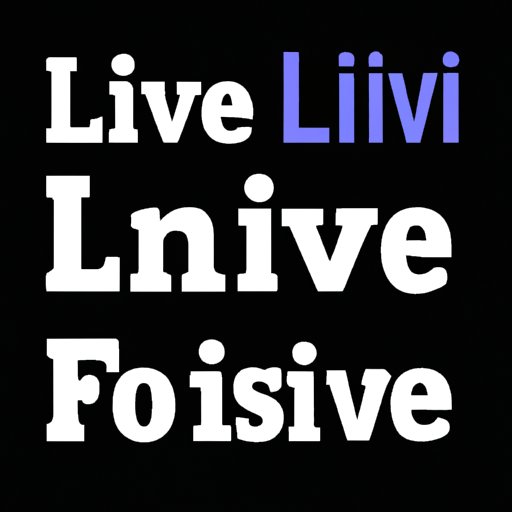Introduction
Streaming live performances on platforms such as Facebook Live can be a great way to engage with your audience. However, it is important to ensure that the music you use during your stream does not infringe any copyright laws. In this article, we will explore some creative ways of playing music on Facebook Live without running into any copyright issues.
Creating Your Own Music
One of the best ways to ensure that you are not infringing any copyright laws when playing music on Facebook Live is by creating your own music. This can be done using a digital audio workstation (DAW) or sound editor. DAWs are programs used for recording, mixing, sequencing and editing audio. Popular DAWs include Ableton Live, Pro Tools and Logic Pro. Sound editors such as Audacity are also useful tools for creating custom music.
Using a DAW or sound editor has a number of advantages. Firstly, it allows you to customize the music to fit your needs. Secondly, it gives you complete control over the music, allowing you to make changes at any time. Finally, it guarantees that you will not be infringing any copyright laws.
However, creating your own music does have some drawbacks. It can be time-consuming and requires a certain level of skill in order to create quality music. Furthermore, it may be difficult to find the right instruments or sounds for your music. For these reasons, many people opt to use royalty-free music instead.
Utilizing Royalty-Free Music
Royalty-free music is music that can be used without paying royalties or fees each time it is used. This means that once you have obtained the license for the track, you can use it multiple times without having to pay additional fees. Royalty-free music is widely available online and can be found on websites such as AudioJungle, Pond5 and Free Music Archive.
Using royalty-free music has a number of benefits. Firstly, it is often cheaper than creating your own music. Secondly, it allows you to access a wide variety of music without having to spend a lot of time searching for the right track. Finally, it ensures that you are not infringing any copyright laws.
Exploring Creative Commons Licenses
Creative Commons licenses are another option for playing music on Facebook Live without copyright infringement. A Creative Commons license is a type of copyright license that allows the creator of a work to give permission for others to use their work under certain conditions. Creative Commons licenses come in a variety of forms and allow for different levels of usage.
In order to find tracks with Creative Commons licenses, you can search for them on websites such as Jamendo, ccMixter and Free Music Archive. These websites allow you to easily search for music that is licensed under Creative Commons and allows you to filter your search based on the type of license you are looking for.
Finding Public Domain Music
Public domain music is another option for playing music on Facebook Live without copyright infringement. Public domain music is music that is no longer protected by copyright and can be used freely without obtaining permission from the copyright holder. Public domain music can be found on websites such as Musopen, the Internet Archive and IMSLP.
Using public domain music has a number of benefits. Firstly, it is free to use and can be used without obtaining permission from the copyright holder. Secondly, it is widely available and can be easily found online. Finally, it ensures that you are not infringing any copyright laws.
Obtaining Sync Licenses
If you want to use commercially released music on Facebook Live, you will need to obtain a sync license. A sync license is a type of copyright license that allows you to use copyrighted music in a video or other audio-visual work. In order to obtain a sync license, you will need to contact the copyright holder and negotiate a fee.
Obtaining a sync license has a number of advantages. Firstly, it allows you to legally use commercially released music on Facebook Live. Secondly, it allows you to use the exact track that you want, rather than having to settle for a royalty-free version. Finally, it ensures that you are not infringing any copyright laws.
Streaming Live Performances
Finally, another option for playing music on Facebook Live without copyright infringement is to stream live performances. Live streaming is becoming increasingly popular and provides an easy way to engage with your audience in real-time. Streaming live performances allows you to use copyrighted music without having to worry about copyright infringement.
Live streaming has a number of benefits. Firstly, it allows you to interact directly with your audience and provide a unique experience. Secondly, it allows you to showcase your talents and skills. Finally, it allows you to use copyrighted music without having to worry about copyright infringement.
Conclusion
Playing music on Facebook Live without copyright infringement can be a tricky task. However, with a bit of creativity and knowledge of the various options available, you can easily find ways to play music without infringing any copyright laws. These options include creating your own music, using royalty-free music, exploring Creative Commons licenses, finding public domain music and obtaining sync licenses. You can also stream live performances, as this allows you to use copyrighted music without worrying about copyright infringement.
With the right approach, you can ensure that you are playing music on Facebook Live without running into any copyright issues. The key is to take the time to research the various options available and choose the one that best suits your needs.
(Note: Is this article not meeting your expectations? Do you have knowledge or insights to share? Unlock new opportunities and expand your reach by joining our authors team. Click Registration to join us and share your expertise with our readers.)
